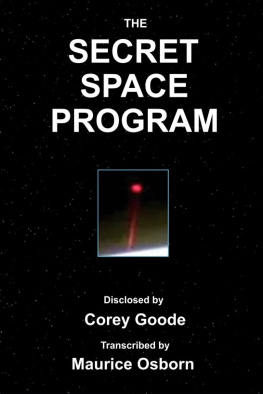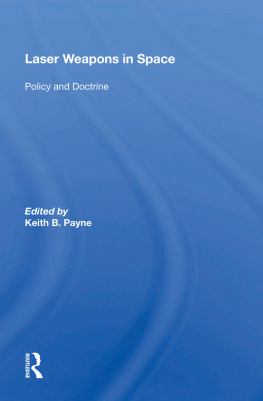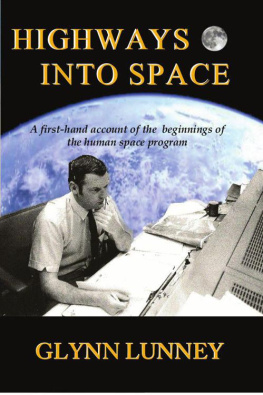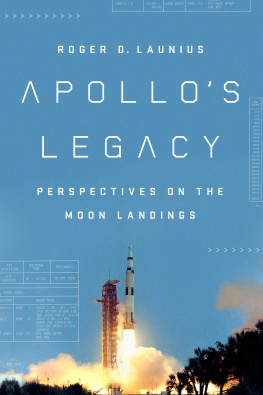Can Democracies
Fly in Space?
The Challenge of Revitalizing the U.S. Space Program
W. D. KAY
Westport, Connecticut
PRAEGER London
Library of Congress Cataloging-in-Publication Data
Kay, W. D.
Can democracies fly in space?: the challenge of revitalizing the U.S. space program / W. D. Kay.
p. cm.
Includes bibliographical references and index.
ISBN 0-275-95254-1 (alk. paper)
1. Astronautics and state--United States. 2. Astronautics-- Research--Government policy--United States. 3. United States. National Aeronautics and Space Administration--Reorganization.
1. Title.
TL789.8.U5K34 1995
387.8'0973--dc2O 95-13917
British Library Cataloguing in Publication Data is available.
Copyright 1995 by W. D. Kay
All rights reserved. No portion of this book may be reproduced, by any process or technique, without the express written consent of the publisher.
Library of Congress Catalog Card Number: 95-13917
ISBN: 0-275-95254-1
First published in 1995
Praeger Publishers, 88 Post Road West, Westport, CT 06881
An imprint of Greenwood Publishing Group, Inc.
Printed in the United States of America
+ OTM
The paper used in this book complies with the Permanent Paper Standard issued by the National Information Standards Organization (Z39.48-1984).
10 9 8 7 6 5 4 3 2 1
To my parents, who gave me life and made it all possible; and to Jennifer, my partner in life, who makes it all worthwhile
Contents
Preface
Like many millions of others around the world, I am a devoted follower of the Star Trek television programs. Unlike most other fans I know, however, I tend to view the shows through the eyes of a political scientist. Several years ago, I became aware of an unstated, but extremely important political premise that underlies the Trek universe. We are never told how or when, but sometime in its past, the members of this fictional society made and followed through on a decision--or, more precisely, a series of decisions--to devote considerable (by the look of things) resources to exploring and developing space. And remember, this is supposed to be a depiction of our future.
When the first Star Trek series debuted in the mid-1960s, this premise did not seem to be that far-fetched. NASA and the U.S. space program had been on a steady, if not spectacular, course of progress toward a landing on the Moon, albeit with a few setbacks along the way. The only obstacles to continued advancement in space seemed to be technological; it was just a matter of building this or developing that. Thus, the idea that human beings would routinely live and work in space by the twenty-third century seemed perfectly reasonable, an extension of what Americans were already experiencing.
By the time Star Trek: The Next Generation premiered in 1987, however, matters had become much more complicated. With all of the criticisms of NASA as an organization, constant infighting among public officials over whether or not to proceed with the space station, and the enormous budget deficits that seem to preclude any major new projects, it is very difficult for me to see how we get from here to there, this time for prescriptive, but rather to provide a broader framework for further discussion on the direction of the U.S. space program.
Put another way, the perspective I have adopted is as follows: three decades ago the U.S. government made a decision to support space exploration--including human flight--on a rather large scale. If, as this book contends, our present institutional arrangements and political practices prevent us from carrying out that decision effectively, then we must face up to a crucial choice. Either we consider reforming those arrangements and practices, or else we must rethink our original policy decision. I am not prepared at this time to say which I think is the proper course of action.
When thanking people who helped in the research or writing process, it is customary to consider family and friends at the end of a long list, in a sort of "last, but not least" mention. This book, however, simply would not have been possible without the patience, encouragement, and love of my wife, Jennifer Davis-Kay. Without complaint (well, maybe just a little), she put up with the many nights where I came to bed at 2:00 AM and got up four hours later, not to mention the weeks I was away doing research in Washington. Simply put, her support and caring were an essential part of this book's creation. My friend, fellow Trek enthusiast, and Best Man Fred Pelka also provided a great deal of thoughtful guidance and moral support. And while I am on this topic, I would like to take this opportunity to apologize to my mother-in-law, Susan Davis, for my being locked away in my study during most of her visit last summer.
Much of the material for this book was obtained with the invaluable help of the History Office at NASA Headquarters in Washington. Over the past two years, Chief Historian Roger D. Launius, along with J. D. ("Dill") Hunley, and Lee D. Saegesser guided
Finally, I wish to thank my colleagues at Northeastern University, particularly Christopher Bosso, Suzanne Ogden, Michael Dukakis, John F. L. Ross, Robert Gilbert, and Denis Sullivan, who in one way another (sometimes without being aware of it) provided much-needed substantive or logistical help, as well as encouragement during the more difficult times. I am indeed fortunate to be part of an academic department as supportive as this one.
Whatever factual mistakes, errors in interpretation, or logical flaws remain are here only because I failed to pay sufficient attention to the people listed above.
W. D. Kay Northeastern University Boston, Massachusetts
PART I
INTRODUCTION: WHERE DID
WE GO WRONG?
1 A Program Adrift
Over the last two decades it has become increasingly obvious that something is terribly wrong with the U.S. space program. Particularly when compared with the stunning achievements of the 1960s and early 1970s--Surveyor, the Lunar Orbiter missions, the Mariner series, Voyager, the Viking Mars landings, and of course projects Mercury, Gemini, Apollo, and Skylab--recent American ventures into space often appear to be little more than exercises in frustration. Over the past ten years, an inordinate number of missions sponsored by the National Aeronautics and Space Administration (NASA) have suffered from serious delays, massive cost overruns, or mechanical breakdowns:
- On August 21, 1993, the Mars Observer spacecraft suddenly stopped transmitting just as it was preparing to enter Martian orbit. Despite repeated efforts by NASA scientists and engineers, it was never heard from again. The precise reason for the failure of the $1 billion probe remains unknown. Its loss has seriously affected the research of hundreds of scientists, postdoctorate and graduate students, and future investigators, and will also have an impact on a number of upcoming Mars missions that had planned to make use of its data. 1







